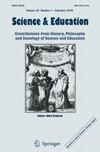Developing Students’ Critical Thinking Skills and Argumentation Abilities Through Augmented Reality–Based Argumentation Activities in Science Classes
Abstract
Due to the COVID-19 pandemic and adapting the classes urgently to distance learning, directing students’ interest in the course content became challenging. The solution to this challenge emerges through creative pedagogies that integrate the instructional methods with new technologies like augmented reality (AR). Although the use of AR in science education is increasing, the integration of AR into science classes is still naive. The lack of the ability to identify misinformation in the COVID-19 pandemic process has revealed the importance of developing students’ critical thinking skills and argumentation abilities. The purpose of this study was to examine the change in critical thinking skills and argumentation abilities through augmented reality–based argumentation activities in teaching astronomy content. The participants were 79 seventh grade students from a private school. In this case study, the examination of the verbal arguments of students showed that all groups engaged in the argumentation and produced quality arguments. The critical thinking skills of the students developed until the middle of the intervention, and the frequency of using critical thinking skills varied after the middle of the intervention. The findings highlight the role of AR-based argumentation activities in students’ critical thinking skills and argumentation in science education.

 求助内容:
求助内容: 应助结果提醒方式:
应助结果提醒方式:


